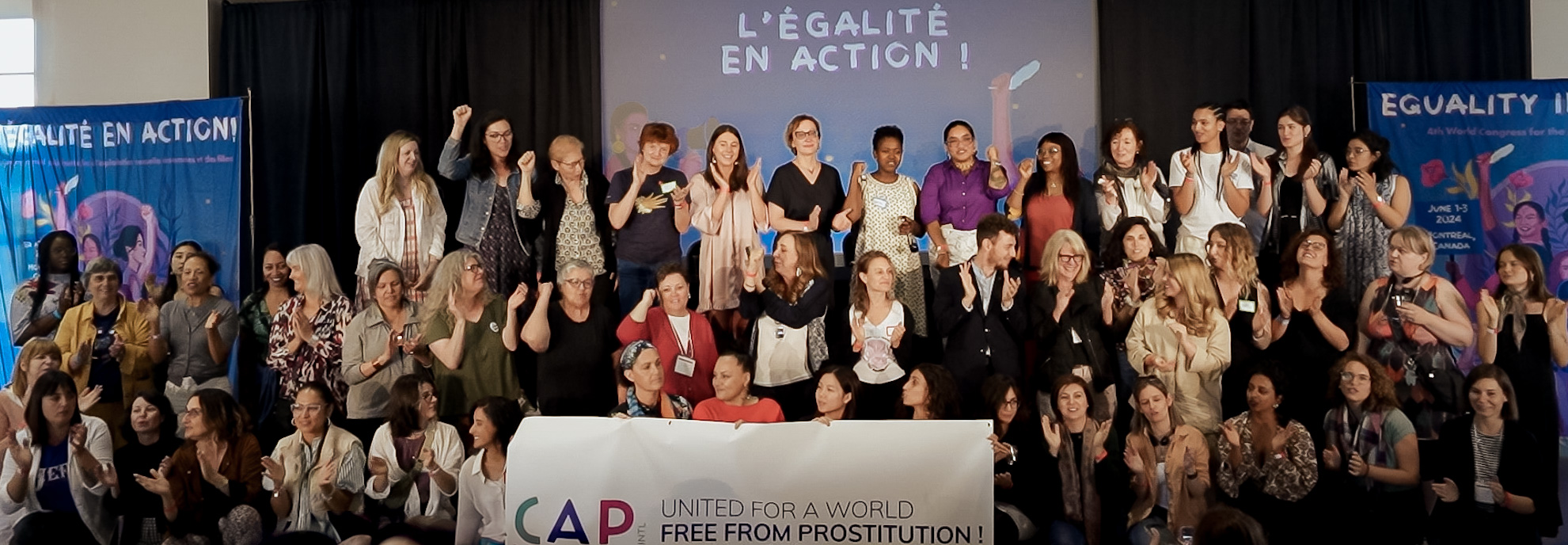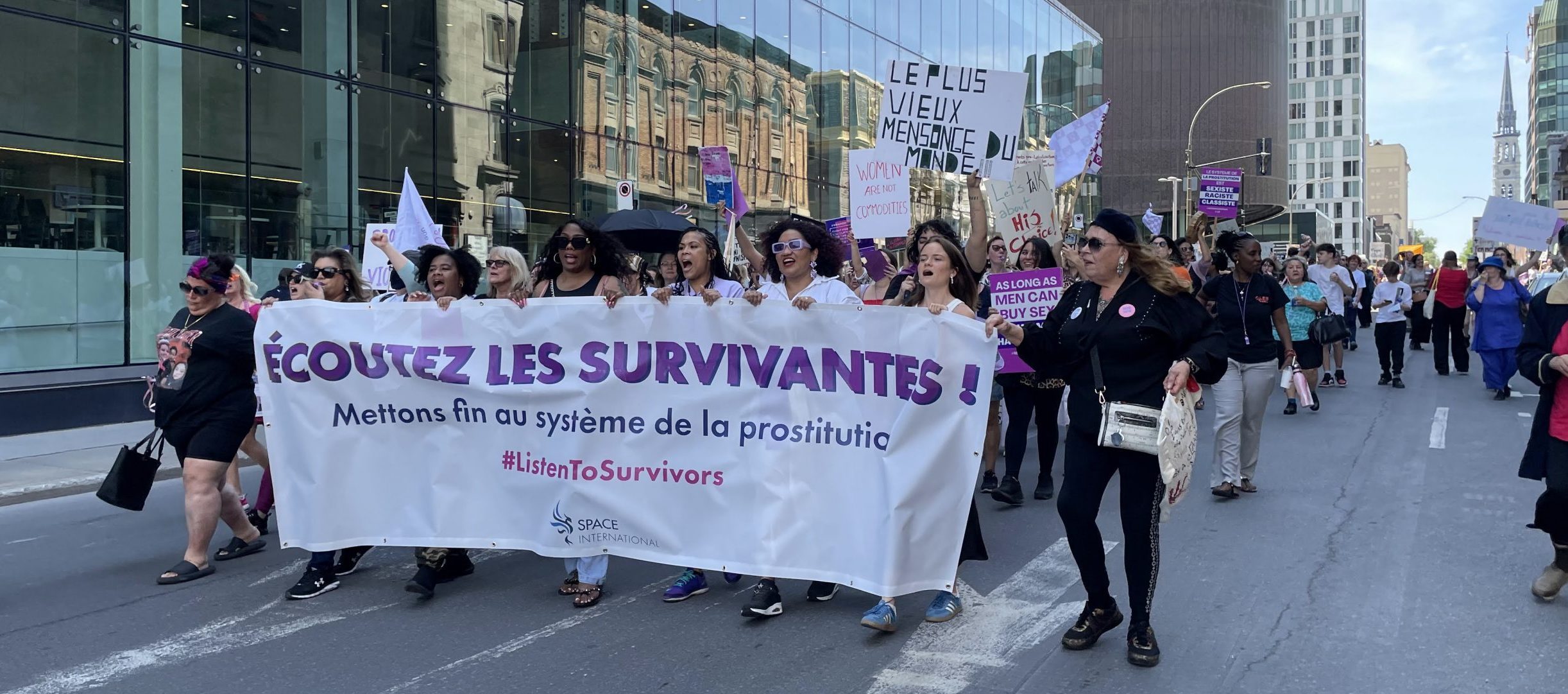The 19th century witnessed the abolition of legal slavery. The 20th century granted people worldwide the right to vote. Could the 21st century be the one that consigns prostitution to the dustbin of history? This is the hope of the global prostitution abolitionist movement, which convened for its Fourth World Congress in Montreal this June.
 4th World Congress 2024, captured by photographer Maika Charette.
4th World Congress 2024, captured by photographer Maika Charette.
“As survivors of prostitution, we know all too well that equality between women and men will remain out of reach as long as men use their privilege to buy access to women’s bodies,” said Cherie Jimenez, a survivor of prostitution and president of the Coalition for the Abolition of Prostitution (CAP International), during her opening speech.
The Congress began with the ‘World Survivors of Prostitution’s March,’ where participants called on governments and civil society to recognize prostitution as a violation of human dignity, a form of male violence against women, and a fundamental barrier to gender equality. The march also demanded an immediate end to the impunity enjoyed by sex buyers and pimps.
The sun shone brightly as nearly 400 participants marched through the streets of Montreal, their determination and optimism unmistakable. Powerful slogans echoed throughout the march, occasionally interwoven with inspiring songs like Destiny’s Child’s ‘Independent Women’ and ‘Survivor.’
One slogan that stayed with me was, ‘No more stolen sisters!’—chanted through a megaphone by April Eve, an Indigenous Canadian woman and survivor of prostitution. The slogan draws attention to the ongoing crisis of missing and murdered Indigenous women. Dressed in vibrant, patchwork-style clothing, she carried the message on the back of her jacket as well, amplifying its significance.
Placards bearing messages like ‘Let’s talk about his choice,’ ‘No john is a good john,’ ‘As long as men can buy sex, all women have a price,’ ‘Prostitution is sold and bought rape,’ ‘Le plus vieux mensonge du monde,’ and ‘Vos désirs ne sont pas des ordres’ filled the demonstration procession.
The march concluded at Marché Bonsecours, one of Montreal’s most iconic landmarks, distinguished by its impressive dome that crowns the roof and shapes the city’s skyline. The congress took place on the second floor, in spacious rooms with large windows that bathed the space in natural light, fostering an inspiring atmosphere.
 Photographer: Felicia Womack 2024
Photographer: Felicia Womack 2024
The congress, organized by CAP International, stands as a hopeful example of global cooperation among prostitution abolitionists. It gathered nearly 400 participants from over 20 countries, including representatives from Sweden: Saga Brodersen of Inte Din Hora, Clara Berglund of the Swedish Women’s Organizations, Meghan Donevan of Talita, Ingrid Bilowich-von Ahn of The ILVA Foundation, and the undersigned, representing the newly founded organization Wake Up Brother.
Strategies to abolish prostitution were discussed by leading global experts, researchers, activists, parliamentarians, lawyers, writers, and social workers. A total of 40 speakers and 60 survivors of prostitution shared their experiences and efforts to implement, enforce, and uphold abolitionist legislation.
The conference featured powerful testimonies from women who had survived prostitution, along with panel discussions, workshops, and exhibitions. Among the most prominent speakers were France’s Minister for Gender Equality, Aurore Bergé, who joined via video link from Paris, Canadian Senator Julie Miville-Dechêne, and internationally renowned researcher Dr. Melissa Farley. Dr. Farley, who last presented a report in Sweden in 2023, defined pornography as filmed prostitution.
Kerstin Neuhaus, representing Alliance Nordic Model in Germany, spoke about the situation in the country leading up to the 2024 European Football Championship. Major sporting events like this often attract large numbers of men seeking to buy sex, resulting in a sharp increase in trafficking and the exploitation of women. To combat this, the organization produced red postcards featuring the message ‘Red card for sex buyers’ in three languages. Participants were encouraged to take selfies with these cards and share them on social media to amplify the message.
During a panel discussion on pornography, American law professor and feminist icon Catharine MacKinnon, renowned for her groundbreaking work in feminist legal theory and anti-pornography legislation, presented ten reasons why pornography and prostitution are fundamentally the same. She described both as being rooted in what she aptly terms ‘You do what I say-sex.’
For many years, I have followed the inspiring journey of Colombian prostitution survivor Claudia Quintero, who has become a leading figure in Colombia’s anti-trafficking and abolitionist movement. I reached out to her, and our exchange led to a memorable dinner together after a long day at the congress. With boundless energy, Claudia shared her story in Spanish, recounting how she became a victim of the armed conflict that has plagued Colombia for decades. For over ten years, she was sold into prostitution across the country. Today, she is the founder of Fundación Empoderamia, an organization dedicated to helping women escape prostitution. Living under a protected identity, she is accompanied at all times by two bodyguards to ensure her safety.
One of the most disheartening revelations during the congress came from the workshop titled ‘The United Nations System: Friend or Foe of Women and Girls in Prostitution,’ led by Taina Bien-Aimé of the Coalition Against Trafficking in Women (CATW). The workshop provided an overview of how the UN and its various bodies, including UN Women, as well as organizations such as Amnesty International and Human Rights Watch, address issues of sexual exploitation, the prostitution system, and male demand for it. It became clear that these entities are deeply influenced by the ‘sex work is work’ ideology and exclusively adopt ‘sex work’ terminology.
In this context, it was particularly heartening to hear Reem Alsalem of Jordan, the UN Special Rapporteur on violence against women and girls, present her new report, A/HRC/56/48. This report, the result of three years of work, concludes that prostitution is an inherently violent system rooted in gender inequality. Alsalem, like MacKinnon and Farley, highlights that pornography must be recognized as filmed prostitution, noting how it normalizes systematic violence against women by blurring the boundaries between sex and sexual violence. Alsalem rejects the terms ‘sex work’ and ‘sex worker,’ opting instead for language such as ‘exploitation of women and girls’ to more accurately reflect the reality of the situation. Her UN report asserts that prostitution constitutes a crime against humanity and underscores the key issues discussed during the congress. The report calls on states to repeal laws that enable the exploitation of women and girls in prostitution and pornography and to adopt abolitionist legislation modeled after the Swedish approach.
The Montreal Congress was a resounding success, leaving us invigorated with renewed strength and determination. Bolstered by the support of the new UN report, which we hope will rectify long-standing misconceptions by human rights organizations and governments, we are intensifying our fight for a world free from prostitution. Until the world recognizes prostitution as the heinous crime against humanity that it truly is, we will continue to fight tirelessly for every individual’s right to dignity and freedom.
Felicia Womack
Founder of Wake Up Brother




